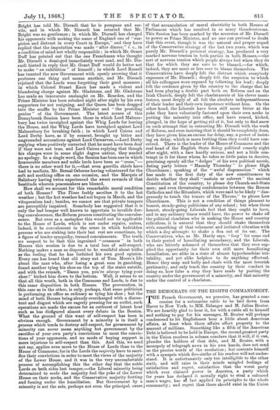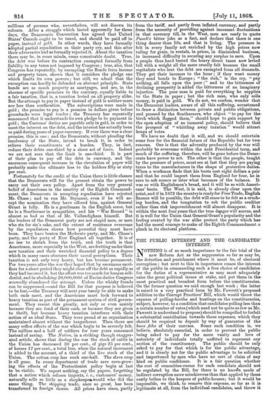THE DEMOCRATS ON THE EIGHTH COMMANDMENT.
THE French Government, we perceive, has granted a con- cession for a submarine cable to be laid down from Havre to New York, to MM. Erlanger and M. Julius Reuter. We are heartily glad to hear it, for with a cable all to himself and nothing to pay for his messages, M. Reuter will perhaps condescend to let Englishmen hear a little about American affairs, at least when those affairs affect property to the amount of millions. Something like a fifth of the American Debt is believed to be held in Europe, the second greatest party in the Union resolves in solemn conclave that it will, if it can, plunder the holders of that debt, and M. Reuter, with a monopoly of telegraph news in his own hands, does not send us the precise words of the resolution ; but contents himself with a synopsis which five-sixths of his readers will not under- stand. It is unfortunately only too intelligible to the other sixth, and will raise in their minds mingled feelings of satisfaction and regret, satisfaction that the worst party which ever claimed power in America, a party which for years has declared it morally right to steal a coloured man's wages, has at last applied its principles to the whole community ; and regret that there should exist in the Union
millions of persons who, nevertheless, will not disown its colours. After a struggle which lasted apparently for three days, the Democratic Convention has agreed that United States' Oonsols ought to be taxed, and should be paid off in paper, instead of gold. In other words, they have formally adopted partial repudiation as their party cry, and this after their adversaries had as formally rejected it. About the taxation there may be, in some minds, some conceivable doubt. True, the debt was before its contraction exempted formally from liability to any taxes not imposed by Congress ; true, also, that Congress has repeatedly, by exempting the Bonds from income and property taxes, shown that it considers the pledge one which limits its own powers ; but still, we admit that the exemption can hardly be defended on abstract principle. State bonds are as much property as mortgages, and are, in the absence of specific promises to the contrary, equally liable to a fair taxation, that is, a taxation levied on all property alike. But the attempt to pay in paper instead of gold is neither more nor less than confiscation. The subscriptions were made in gold ; the promise to pay is a promise in dollars given before greenbacks were legal tender ; the Treasury has repeatedly announced that it understands its own pledge to be payment in gold ; the Customs' duties are payable only in gold, in order to meet the interest on the debt, and the interest has actually been so paid during years of paper currency. If ever there was a clear promise, this is one ; and the Democrats, without pleading the insolvency of the State, intend to break it, in order to relieve their constituents of a burden. They, in fact, reduce their debts one-third by a sheer act of force. Indeed we are not sure that the limit is one-third. It is part of their plan to pay off the debt in currency, and the enormous consequent increase in the circulation of paper will probably make the ultimate loss to the holders fifty or sixty per cent.
Fortunately for the credit of the Union there is little chance that the Democrats will for the present obtain the power to carry out their own policy. Apart from the very general belief of Americans in the sanctity of the Eighth Command- ment, the Democrats in accepting repudiation have rejected Mr. Chase ; and to run Mr. Seymour, even if he will ac- cept the nomination they have offered him, against General Grant is folly. He is a gentleman in the English sense, but he is a Southerner in sympathies, and his " War Record " is almost as bad as that of Mr. Vallandigham himself. But the leaders of the Democrat party are not stupid men, or men who sin for sin's sake, and the extent of resistance overcome by the repudiators shows how powerful they must have been. They have beaten the Moderate party, and Mr. Chase's party, and the party of New England all together. It is of no use to shrink from the truth, and the truth is that Americans, more especially in the West, are fretting under their new taxation and their wretched financial policy to a degree which in many cases obscures their moral perceptions. Their taxation is not only very heavy, but has become permanent. For two years after the war they hoped that by enormous sacri- fices for a short period they might clear off the debt as rapidly as they had incurred it, but the effort was too much for human self- denial, and in abolishing 20,000,0001. of Excise duties Congress avowedly abandoned the attempt. Unless the whisky frauds can be suppressed,—and the Bill for that purpose is believed to be lost,—the Treasury will next year barely be able to make both ends meet, and the Americans must look forward to heavy taxation as part of the permanent system of civil govern- ment. They resent this greatly, not only or even mainly because they are fond of their cash, or because they are given to thrift, but because heavy taxation interferes with their notion of an ideal State. They were proud of an organization maintained almost without the taxgatherer. Then there are many reflex effects of the war which begin to be severely felt. The million and a half of soldiers for four years consumed instead of saving. The Nation, in a striking though exagger- ated article, shows that during the war the stock of cattle in the Union has decreased 30 per cent., of pigs 25 per cent., of horses 17 per cent., a total loss, when the natural increment is added to the account, of a third of the live stock of the Union. The cotton crop has sunk one-half. The slave crop is all gone. In every department of trade save corn-grow- ing the effects of the Protectionist policy begin at last to be visible. We export nothing, say the papers, forgetting that a nation which refuses imports, i. e., customers' money, naturally sells as little as a shopkeeperbwould who did the same thing. The shipping trade, once so great, has been transferred to foreign shores. All prices have risen, partly from the tariff, and partly from inflated currency, and partly from the necessity of providing against incessant fluctuations in that currency till, in the West, men are ready to quote Punch's bitter joke as a fact, and declare that there is one thing dearer than life, and that is living. The pressure is felt in every family not enriched by the high prices now ruling for grain, in rentals, in prices, in diminished business, in increased difficulty in securing any surplus to save. Upon a people thus hard bested the heavy direct taxes now levied fall with a weight all the more cruelly felt because the small capitalists who lent the debt are exempted from all demands. They get their incomes to the hour ; if they want money they send bonds to Europe ; " the rich," is the cry, " pay nothing, all falls upon the poor ;" and to the bitterness of declining prosperity is added the bitterness of an imaginary injustice. The poor man is paid for everything he supplies- to the State in paper ; but the rich man, who only sells money, is paid in gold. We do not, we confess, wonder that the Democrat leaders, aware of all this suffering, accustomed to draw a distinction between private and public obligations, and pressed by the Southerners, who object "to pay for the- birch which flogged them," should hope to gain support by the open adoption of an immoral policy, should believe that the prospect of " whittling away taxation " would attract heaps of votes.
We have no doubt that it will, and we should entertain some fear for the financial future of the Republic but for two- reasons. One is that the adversity produced by the war will probably be overcome within the next Presidential term, and much of the suffering, therefore, will be gone before the Demo- crats have power to act. The other is that the people, taught by the pressure of prices, must see at last that they are paying- taxes to the manufacturers in the shape of protective duties. When a workman finds that his boots cost eight dollars a pair and that he could import them from England for four, he is sure to ask sooner or later what becomes of the balance. It was so with Englishmen's bread, and it will be so with Ameri- cans' boots. The West, it is said, is already clear upon the- point, and if in 1872 the countryis ready for Free Trade, English finance will be possible, the debt will cease to be felt as a crush- ing burden, and the temptation to rob the public creditor- rather than risk impoverishment will almost disappear. It is within the next four years that the true danger will accrue, and' it is well for the Union that General Grant's popularity and the- feeling created by the war alike protect the party which has- had the moral courage to make of the Eighth Commandment a plank in its electoral platform.































 Previous page
Previous page